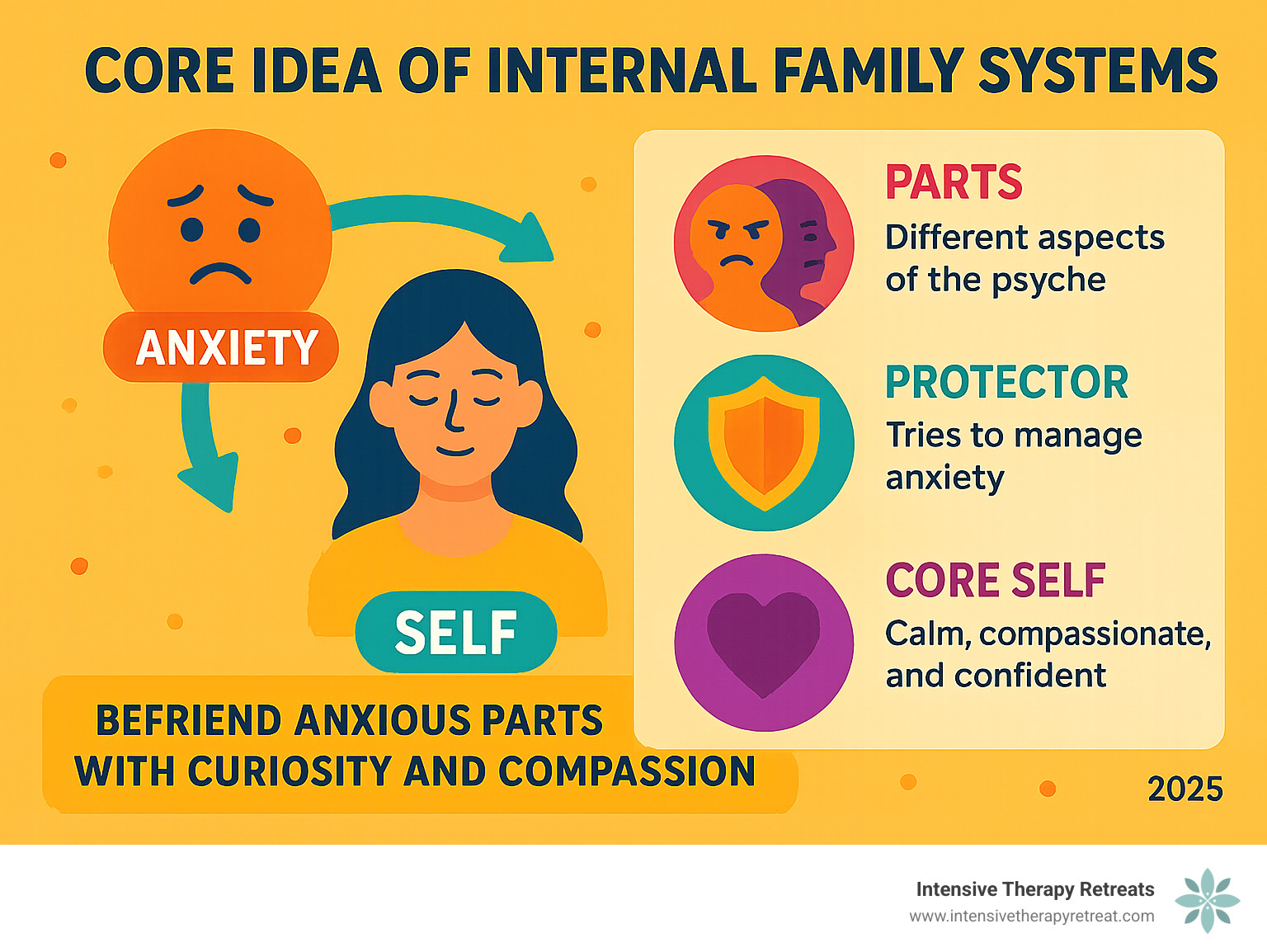A New Way to Understand Your Worry
Internal family systems therapy for anxiety offers a compassionate approach that views your worry not as a problem to be eliminated, but as a protective part of you trying to help. Instead of battling anxious thoughts, IFS teaches you to befriend them with curiosity and compassion.
Quick Answer: How IFS Works for Anxiety
- Reframes anxiety as a protective part trying to keep you safe.
- Identifies underlying wounds (exiled parts) that anxious protectors are guarding.
- Connects you with your core Self—the calm, compassionate leader within.
- Uses internal dialogue to understand what your anxious parts need.
- Heals root causes rather than just managing symptoms.
- Builds lasting emotional regulation through Self-leadership.
Developed by Dr. Richard Schwartz, this approach recognizes that we all have multiple “parts” within us. When we see anxiety as a well-meaning part trying to prevent future pain, we can begin to work with it, not against it.
The beauty of IFS is its non-pathologizing nature. You’re not broken; you’re a complex system of parts that developed to help you survive. Some parts took on burdensome roles like constant worry, but they did so with positive intent.
As Dr. Bambi Rattner, Psy.D, I’ve witnessed the transformative power of internal family systems therapy for anxiety, particularly in intensive retreat formats that allow for deep, accelerated healing. My experience has shown me that people have an incredible capacity to heal from within.
Internal family systems therapy for anxiety terms to know:
What is Internal Family Systems (IFS) and How Does It View the Mind?
Ever feel like different parts of you are pulling in different directions? This is the core idea behind Internal Family Systems (IFS). Developed by Dr. Richard Schwartz, IFS suggests our mind is like an inner family, with many “parts” that have unique thoughts, feelings, and intentions. This concept of a “multiplicity of mind” is a fundamental truth about how we experience ourselves.
IFS believes that every part has a positive intention, even if its actions cause distress. Your inner system always aims for harmony, but when parts are forced into extreme roles by past hurts, that harmony is disrupted, often leading to symptoms like anxiety. In internal family systems therapy for anxiety, we listen to these inner voices to understand and heal the deeper reasons for your distress. You can learn more about these ideas from The IFS Institute and explore How IFS Therapy Works in more detail.
The Core Self: Your Inner Source of Healing
At the heart of every person is the ‘Self’—your innate, wise, and compassionate core. It’s not another part, but the calm, confident leader of your inner system. Even when you feel overwhelmed by anxiety, your Self is always there, waiting to be accessed. Connecting with your Self provides a stable, resourceful base from which to approach your anxious parts with healing qualities instead of fear.
IFS describes these qualities as the “8 C’s” and “5 P’s”:
- The 8 C’s of Self: Calm, Curiosity, Compassion, Confidence, Courage, Clarity, Creativity, and Connectedness.
- The 5 P’s of Self: Presence, Patience, Perspective, Persistence, and Playfulness.
By tapping into this Self-energy, you can approach anxiety not as an enemy, but as a signal from a part that needs your care. This shift in perspective is a powerful step toward healing.
The Three Types of Parts in Your Inner World
IFS groups parts into three main types, each playing a specific role. Understanding them is key to seeing how internal family systems therapy for anxiety works.
-
Managers: These proactive protectors try to keep you safe by managing your life to prevent pain. A “worry manager” might constantly scan for danger, while a “perfectionist manager” pushes for flawlessness to avoid criticism. Their good intentions can become extreme, leading to anxiety and control issues.
-
Firefighters: These reactive protectors jump in when deep emotional pain is triggered. Their job is to numb that pain by any means necessary, which can lead to impulsive behaviors like overeating, excessive shopping, or angry outbursts. They try to douse the emotional fire, but sometimes their methods make things worse.
-
Exiles: These are the young, vulnerable parts holding past hurts, fears, and shame from difficult experiences. They were “exiled” from consciousness to help you cope. When triggered, they bring up intense emotional pain, which managers try to prevent and firefighters try to numb.
These parts form a complex protective system. Our goal in IFS is to help them trust your Self, allowing them to let go of their extreme burdens and find more balanced roles. You can learn more about The Three Different Sub-Types of Internal Family Systems Model in depth.
How Internal Family Systems Therapy for Anxiety Works
Internal family systems therapy for anxiety transforms how we see our worried minds. Instead of an enemy, anxiety is a messenger—a protective part trying to keep us safe. This shift from fighting to befriending opens new paths to healing.
Through gentle inner dialogue, we learn what our anxious parts are protecting us from and what they need to feel safe. This approach targets the root causes of anxiety, not just the symptoms. Your anxiety isn’t random; it’s usually guarding vulnerable parts hurt in the past. By understanding this relationship, we can heal both the protectors and the wounded parts they guard.
Managers and Firefighters: The Anxious Protectors
Your anxious parts are protectors that sometimes create more stress than safety.
Manager parts are proactive, scanning for future trouble. The worry manager runs “what if” scenarios, the perfectionist manager demands flawlessness to avoid rejection, and the control manager tries to micromanage life. They work hard to prevent pain, but their methods can amplify fear.
Firefighter parts are reactive, leaping in when deep emotional pain is triggered. Their job is to douse the fire of overwhelming feelings, often through extreme measures like numbing behaviors (overeating, endless scrolling) or distractions (overworking, compulsive shopping). Even panic attacks or rage outbursts can be a firefighter’s desperate attempt to shut down deeper pain.
Crucially, every one of these protectors believes it’s helping. They aren’t trying to make you miserable; they’re trying to save you from something they see as worse. This understanding is key to healing.
Exiles: The Hidden Wounds Fueling Anxiety
Beneath the protectors are the exile parts—tender, young aspects holding deep hurts from past abandonment, shame, or trauma. To help you survive, your system pushed these overwhelming feelings away, or “exiled” them from your conscious mind.
But these exiled feelings remain, carrying their original pain. Your anxious protectors work tirelessly to ensure these vulnerable parts aren’t triggered again. For example, an exile carrying a fear of abandonment might be protected by a manager who overanalyzes conversations. If that fear is triggered, a firefighter might react with rage to push the threat away.
When we learn to safely connect with these exiles from our compassionate Self, listen to their stories, and help them release their burdens, the protectors can finally relax. They no longer need to work so frantically because the parts they were guarding have received the healing they always needed. This is where The Power of Internal Family Systems (IFS) to Steer Trauma becomes vital, as lasting healing comes from addressing these root wounds.
Practical IFS Techniques to Calm and Center Yourself
Internal family systems therapy for anxiety provides a toolkit of gentle ways to soothe your mind by building a compassionate relationship with yourself.
At its core is mindfulness—noticing what’s happening inside you without judgment. This helps you ‘unblend’ from your parts. Instead of ‘I am anxious,’ you can say, ‘A part of me feels anxious.’ This small shift creates space for your calm, wise Self to lead. Other tools like self-compassion, grounding exercises, and journaling help you connect with your Self and offer the calming presence your anxious parts need. For a deeper dive, explore Internal Family Systems Interventions.
The “U-Turn”: Turning Inward with Curiosity
When anxiety arises, instead of pushing it away, IFS suggests a “U-Turn”: turning your attention inward to understand it. This is a powerful way to handle daily triggers.
- Identify the Part: Pause and notice where you feel the anxiety. Is it a knot in your stomach, racing thoughts, a tight chest? Simply acknowledge it.
- Take Some Space (Unblend): Gently ask the anxious part to step back a little, so you can observe it without being swept away. This helps your Self come forward.
- Start a Dialogue: From a place of Self, get curious. Ask the part: “What do you want me to know?” “What are you afraid of?” “What do you need from me?”
- Listen Without Judgment: Hear what the part communicates through thoughts, images, or feelings. Your only job is to listen. This helps the part feel seen and lessens its need to be so loud.
Befriending and Unburdening Your Parts
The ultimate goal of internal family systems therapy for anxiety is deep, lasting healing by befriending and unburdening your parts, especially the vulnerable ‘exiles’ carrying past pain.
This profound process involves:
-
Building Trust with Protectors: Before approaching an exile, you must connect with its protectors (managers and firefighters). From your Self, thank them for their hard work and reassure them that you are strong enough to handle the exile’s pain. Ask their permission to proceed.
-
Connecting with and Witnessing Exiles: Once protectors relax, you can approach the vulnerable exile with the compassion and courage of your Self. Invite it to share its story and listen with deep empathy. Simply being present and hearing its story is incredibly healing.
-
Unburdening and Retrieving: With the exile’s permission, help it release the ‘burdens’ it carries—heavy beliefs or emotions like worthlessness or fear. You can visualize these burdens leaving. Once unburdened, the part can reclaim its natural, positive qualities like joy, creativity, or playfulness.
This process allows exiled parts to heal and reintegrate. When they are no longer burdened, protectors can relax, leading to a lasting reduction in anxiety. You can find exercises to support this in Internal Family Systems Therapy Worksheets.
Long-Term Benefits and How IFS Differs from Other Approaches
Internal family systems therapy for anxiety offers profound, lasting change by fundamentally changing your relationship with anxiety. It fosters emotional regulation from understanding, not suppression, and builds genuine resilience as your inner system learns to work in harmony.
Unlike traditional therapies that often focus on symptom management (e.g., challenging anxious thoughts), IFS promotes collaboration with parts. Instead of viewing anxiety as a flaw to be fixed, IFS sees it as a protector trying to keep you safe. This shift from confrontation to curiosity is key. Rather than arguing with a catastrophic thought, IFS invites you to ask your anxious part, “What are you trying to protect me from?” This focus on internal relationships creates deeper, more sustainable healing.
Long-term benefits of internal family systems therapy for anxiety
The benefits of internal family systems therapy for anxiety are life-changing, helping you feel like you’ve come home to yourself.
- Change your relationship with anxiety: Instead of dreading worry, you learn to see it as communication from a part that cares, reducing the anxiety about being anxious.
- Strengthen Self-leadership: You develop an unshakeable inner compass, allowing you to access your calm, wise Self to steer life’s challenges. Your anxious parts learn to trust you, so they can relax.
- Heal root causes, not just symptoms: By helping parts release old wounds, the entire system finds relief, creating change that ripples through your life.
- Reduce the need for coping mechanisms: As underlying pain is addressed, the urge to numb, avoid, or control naturally diminishes. Learn more about these effects in Positive Impact of Internal Family Systems Therapy (IFS).
Practical applications of internal family systems therapy for anxiety
IFS skills translate naturally into daily life, providing tools for navigating stressors and transitions.
- Managing daily triggers: Recognize which parts are activated and offer them reassurance. Before a meeting, you might tell your anxious perfectionist part, “I know you want this to go well. I’m prepared, and I trust us.”
- Navigating stressful situations: Stay grounded by checking in with your parts, acknowledging their concerns, and moving forward with Self-led clarity.
- Improving relationships: Become less reactive and more present with others by understanding your own triggers and tending to your parts directly.
- Making Self-led decisions: Facilitate inner conversations between conflicting parts to make choices that honor your whole system.
This approach is particularly promising for complex trauma, as shown by growing Research on IFS for PTSD, which often underlies anxiety.
Frequently Asked Questions about IFS for Anxiety
It’s natural to have questions when exploring a new healing approach. Here are answers to common questions about internal family systems therapy for anxiety.
How long does IFS therapy take to work for anxiety?
The timeline for internal family systems therapy for anxiety varies for each person. Some find relief quickly, especially if their anxiety stems from overprotective manager parts. For those with complex trauma or deep-seated exile pain, the process may take more time to ensure a safe, gentle pace. IFS focuses on profound, lasting change, not quick fixes. For those seeking an immersive experience, intensive therapy retreats can accelerate progress, achieving breakthroughs in days that might take months in weekly therapy.
Can I do IFS on my own for anxiety?
Many IFS principles like self-compassion and curiosity can be practiced on your own using books, meditations, and journaling. These are excellent for building self-awareness. However, for deep healing—especially with trauma or vulnerable exile parts—working with a trained internal family systems therapy for anxiety therapist is highly recommended. A therapist provides a safe space, expert guidance to steer intense emotions, and helps you access and maintain a Self-led state, which can be difficult to do alone when parts are highly activated.
When should I seek a therapist trained in IFS?
Consider seeking a therapist trained in internal family systems therapy for anxiety if:
- Your anxiety feels overwhelming or is significantly impacting your life.
- You struggle to “unblend” from anxious or critical parts and access your inner calm.
- You have a history of trauma, as IFS is particularly effective for healing deep wounds.
- You want to heal the root causes of your anxiety, not just cope with symptoms.
- Other therapies haven’t provided lasting relief.
IFS is effective for a wide range of conditions beyond general anxiety, including PTSD, panic attacks, and social anxiety. You can explore the Various Mental Health Conditions That IFS Can Help With to see if it aligns with your needs.
Begin Your Journey to Inner Harmony and Healing
Anxiety doesn’t have to define your life. With internal family systems therapy for anxiety, a more compassionate path is possible. By befriending your inner protectors and healing the underlying wounds they shield, you can move beyond simply managing symptoms. This is a journey of self-compassion, allowing you to reclaim your core Self—the wise, calm leader within—and restore inner harmony.
For those ready to accelerate their healing, Intensive Therapy Retreats offers a unique, immersive environment. Our supportive setting allows you to explore IFS principles with experienced therapists, achieving significant, lasting relief from anxiety in a matter of days, rather than months or years of traditional therapy.
If you’re ready to transform your relationship with anxiety and uncover the power of your internal family, we invite you to take the next step.



